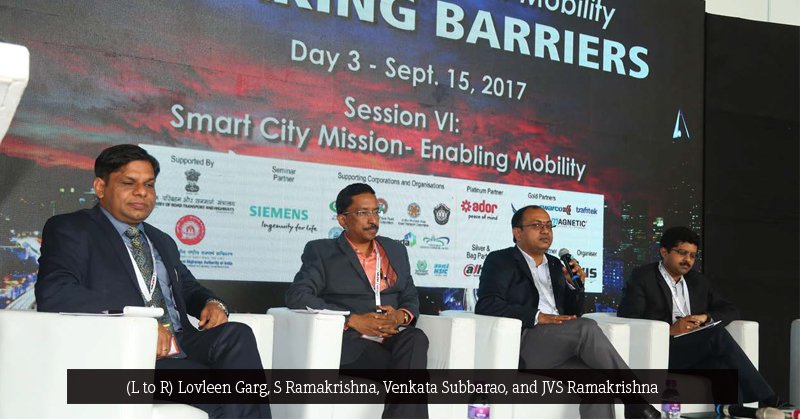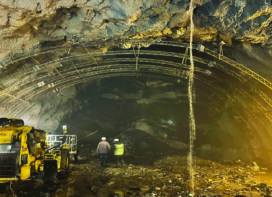 This article by Venkata Subbarao, Associate Director, IBI Group is based on the views expressed by the panelists during a session held at TrafficInfraTech Expo, Hyderabad. The other panel members were Lovleen Garg, Assistant Vice-President and Head- Environment Sustainability, GIFT City; S Ramakrishna, Senior Vice-President, UMTC and JVS Ramakrishna, Head- Business Initiatives & Customer Relations-Smart Cities Infrastructure, L&T Ltd.
This article by Venkata Subbarao, Associate Director, IBI Group is based on the views expressed by the panelists during a session held at TrafficInfraTech Expo, Hyderabad. The other panel members were Lovleen Garg, Assistant Vice-President and Head- Environment Sustainability, GIFT City; S Ramakrishna, Senior Vice-President, UMTC and JVS Ramakrishna, Head- Business Initiatives & Customer Relations-Smart Cities Infrastructure, L&T Ltd.
Smart City Mission, the promise of this tech-savvy approach to urban renewal includes catalyzing economic growth leading to more employment and enhanced incomes for all, an inclusive development especially for poor and disadvantaged, improving quality of life of its Citizens and finally, a clean & sustainable environment. The whole initiative is designed to mesh infrastructure with technology to yield Smart outcomes through the application of ‘Smart’ Solutions. While the Mission is currently concentrating on 100 Cities, the aim is to create a replicable model which will act like a light house to other aspiring cities which ultimately is expected to transform urban India into a sustainable economic engine.
Two years since its grandeur launch, a quick look at the status shows that the take-off has been smooth with identification of 3000 projects worth 1.9 lakh crore impacting 96 million population spread across 90 cities. Of these, 79 projects worth Rs 841 crore are completed with majority of them comprising of IT, control centers and surveillance systems.
A project of this size and scale is bound to have its share of challenges and smartness is in being able to identify them from time to time in advance and undertaking appropriate remedial measures. Until now, the government has been successful in doing so by adopting a professional approach for selection of proposals, projects and engaging in a constant dialogue with the local bodies and meticulous monitoring of the progress.
Challenges and remedies for taking the project to the next stage are being discussed keeping in view the four promises of Smart City Mission i.e., improving quality of fife, ensure Sustainability, achieve economic growth and inclusive development.
 Comprehensive and Integrated Approach– Undertaking projects in haste to demonstrate progress without comprehensive analysis of requirements and review of other associated projects planned in the region by all the other stakeholders can result in duplication of effort, wasteful expenditure and loss of time. Detailed design and implementation planning of the projects requires a comprehensive and integrated approach after due consideration of realistic demand forecasts, user socio-economic and cultural conditions, locally available raw materials, operations and maintenance needs, environmental, sustainability and technological considerations. Integration shall take into account the scope as well as schedule/sequencing of the projects. Planning and design shall take into account the need for implementing infra to enable IT enablement at a later stage. Also changes/amendments to existing policy, regulatory and enforcement rules required or need for new shall be evaluated for implementation, operation and maintenance of the systems.
Comprehensive and Integrated Approach– Undertaking projects in haste to demonstrate progress without comprehensive analysis of requirements and review of other associated projects planned in the region by all the other stakeholders can result in duplication of effort, wasteful expenditure and loss of time. Detailed design and implementation planning of the projects requires a comprehensive and integrated approach after due consideration of realistic demand forecasts, user socio-economic and cultural conditions, locally available raw materials, operations and maintenance needs, environmental, sustainability and technological considerations. Integration shall take into account the scope as well as schedule/sequencing of the projects. Planning and design shall take into account the need for implementing infra to enable IT enablement at a later stage. Also changes/amendments to existing policy, regulatory and enforcement rules required or need for new shall be evaluated for implementation, operation and maintenance of the systems.
For e.g. planning and design of mobility improvement or public transport projects shall take into account the urban form, travel patterns – current and future, fuel type, emissions, available road widths, fare pricing strategy, collection methods, integration with other modes of transport, subsidies for environmental friendly options etc.
Similarly will also cause challenges
Design Projects to attract Private Participation – While the rationale for private participation in public projects is no more a debate, the need of the hour is to build investor confidence and attract the private players to undertake these projects. This can relieve the authorities from the burden of financing, development, operation and maintenance and restricting its role to policy, regulatory, enforcement and performance monitoring activities. Challenge is that most of the existing projects are neither in a bankable form nor there is a regulatory environment to make these projects financially viable. Though Government has undertaken several policy level measures such as those for issuance of municipal bonds and levy of user charges, existing demand and the willingness to pay conditions do not make them attractive. This also requires adopting a concession agreement which shares the risks appropriately amongst the share-holders along with provisions to recourse and re-negotiation under extreme conditions.
Though the vision is incredible and rationale, it is obvious that its delivery shall have its own bunch of challenges, but we Indians have historically proven our critics wrong and demonstrated our capability to deliver such mega projects aimed at transforming the life of common man in the City and we have no doubts in our minds about the success of the same. Gatherings like these give us an opportunity to look back, evaluate, undertake course corrections where we appropriate, re-energize and continue the journey towards the goal.
 TrafficInfraTech Magazine Linking People Places & Progress
TrafficInfraTech Magazine Linking People Places & Progress


